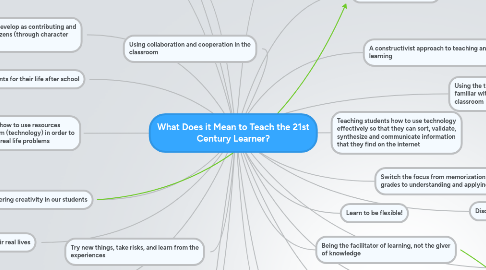What Does it Mean to Teach the 21st Century Learner?
by Sarah Lawrence

1. Fostering creativity in our students
2. Educate students on how to avoid lures that advertisers use on the internet that can suck them in to believing lies or falling for propaganda
3. Using collaboration and cooperation in the classroom
4. Show students how to use resources available to them (technology) in order to solve practical, real life problems
5. Help students develop as contributing and respectable citizens (through character education)
6. Instead of showing students how to know, let students practice skills needed to demonstrate their learning
7. Challenge all levels of learners to LOVE learning and to explore knowledge, history and the world around them
8. Don't look to the past, lead into the future
9. Try new things, take risks, and learn from the experiences
10. Keep students active (mentally and physically)
11. Relate students learning to their real lives
12. Prepare students for their life after school
13. Use simulations, role play and drama in the classroom to emotionally connect students to their learning
14. Sometimes it may even mean asking for help from your students
15. Thinking outside of the box
16. Being the facilitator of learning, not the giver of knowledge
17. Using the technologies that students are familiar with using to engage them in the classroom
18. Teaching students how to use technology effectively so that they can sort, validate, synthesize and communicate information that they find on the internet
19. Using games to teach students
20. Consider learning styles, gender differences, and brain based learning in your instruction
21. Ask for help and collaborate with other teachers and educators
22. Switch the focus from memorization and grades to understanding and applying
23. Learn to be flexible!
24. Inquiry learning
25. A constructivist approach to teaching and learning
26. Involvement, interaction and group work in the classroom
27. Discovery learning!


